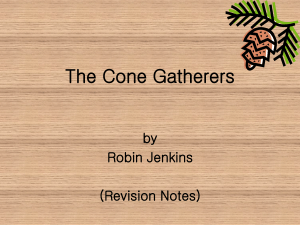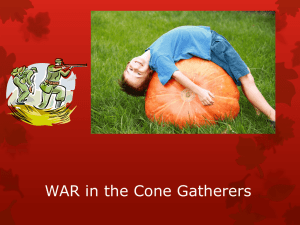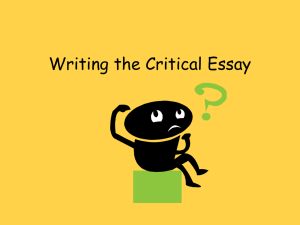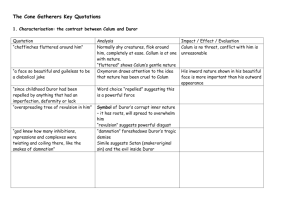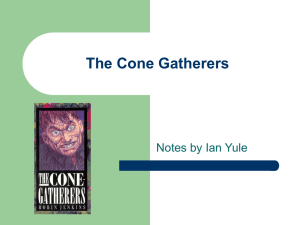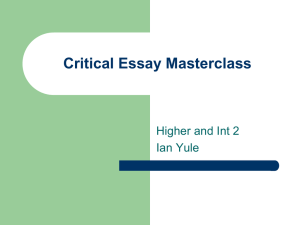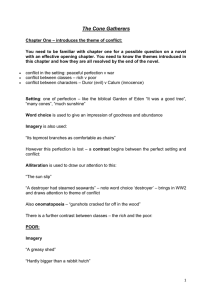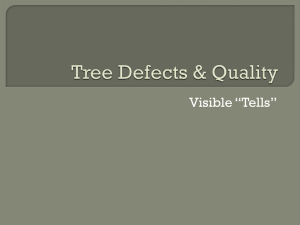The Cone Gatherers
advertisement
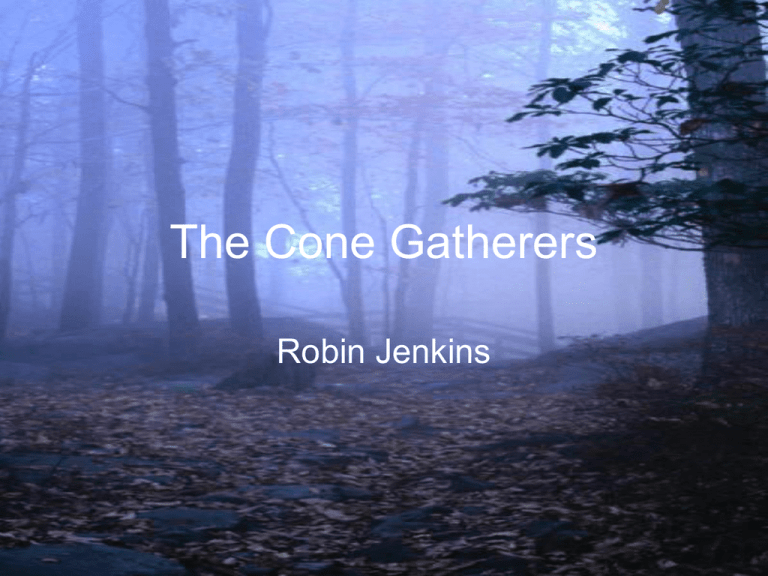
The Cone Gatherers Robin Jenkins The period • Second World War ( 1939-45) • There are many references to the war in the novel ; Captain Forgan is back from the war, the forestry workers from Ardmore are conscientious objectors; Tulloch’s brother has been killed at Dunkirk, Duror refers to ‘the Germans putting idiots and cripples to death in the gas chambers’ • The war provides a moral edge to the book . It suggests that this inhumanity and evil is to be found everywhere and not just in the wood The Moral Question • The eternal war between good and evil • Duror’s hatred of Calum is not fully explained by his wife and the slight irritation of Calum interfering with his traps. • In some ways the wood is like the garden of Eden with Duror lurking around it like the devil. • Calum is a symbol of innocence and has a childlike faith in heaven • We see the parallel between what Hitler was doing to the Jews and the handicapped in Germany and Duror’s attitude to the cone gatherers in the wood Can absolute goodness survive in the world ? Why does evil exist? Duror • ‘read that the Germans were putting idiots and cripples to death in gas chambers. Outwardly, as everybody expected, he condemn such barbarity; inwardly, thinking of idiocy and crippled ness not as abstractions but as embodied in the crouch-backed cone-gatherer, he profoundly approved.’ The religious aspect • The struggle between good and evil • The wood as the Garden of Eden • The cone gatherers being thrown out of the hut like Mary and Joseph being turned away from the Inn at Christmas • Calum’s body hanging from the tree at the end like Jesus on the cross Religion and God’s order • Mrs Lochie says that what happened to Duror’s wife is ‘a punishment from God’ • Mrs Morton says of Calum ‘ the small one’s not as God meant him to be’ • Lady Runcie Campbell struggles between her Christianity and her feudal class. Jenkins describes her attitude towards religion as tolerant but distrustful’. It is only at the end of the book that she breaks free from her mistrust and sense of rank and goes to plead with the cone gatherers to help Roderick down. Class • The absent Sir Colin tells LRC ‘What d’you expect, Elizabeth ? They’re still brutes under the skin y’know…After the war they’ll be trying to drag us down to their level . It’s up to us to see they don’t manage it.’ • Sir Colin sees the war as a threat to the established order Neil sees it as an opportunity and thinks that after the war things will change and people will not be allowed to treat Calum and himself the way they do. • Class is closely related to deformity in the book with the idea that one person can be inherently better than another purely by birth being challenged by Robin Jenkins. Setting - Nature • The link between man and nature in the book gives it depth • Nature can be beautiful but can also be cruel. • Animals hunt for survival – man hunts for fun causing unnecessary pain • Jenkins compares people to animals all the way through the novel but only the cone gatherers are seen as in harmony with nature Setting – The cones • The cones represent resurrection • After the war the cones will enable to wood to come back to life. • When the dead Calum is hanging from the tree the cones drop like blood from his bag- there is no resurrection for him now. The Ending • Lady Runcie Campbell ‘wept and as she wept pity, and purified hope, and joy welled up in her heart’ • This hope can be seen as LRC being changed by Calum’s death in some way so that the world will be a better place now or that Calum is like Christ in that his death brings forgiveness and a new start for the characters in the book maybe hope for mankind in relation to the war in that the sacrifice of the fallen can lead to hope for mankind. The Ending • The novel can be seen as a fable • Set in a wood and imagining the characters as animals all fits in with out idea of a simple tale with a moral at the end. • Roderick see the wood in terms of fable like Sir Galahad and the pilgrim from Pilgrim’s Progress where the characters meet evil and have to struggle to triumph over it to achieve salvation or heaven.
